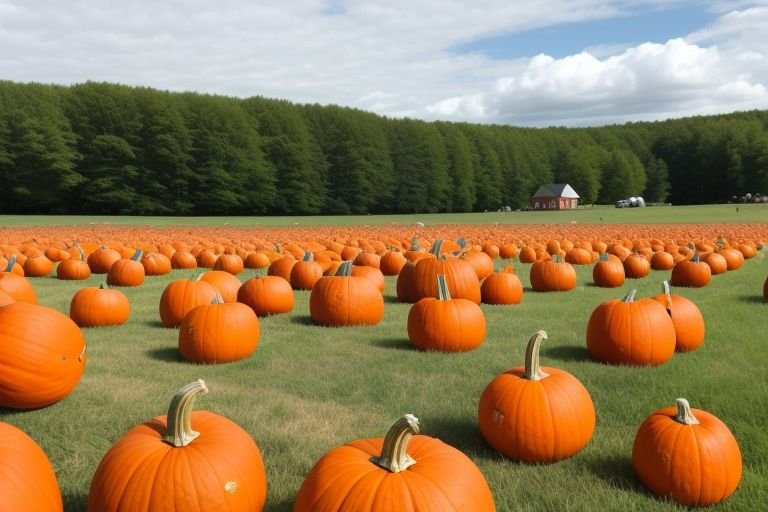
Amherst Farmers Battle Pumpkin Plague Ahead Of Halloween
As Amherst starts putting up the autumn and Halloween decorations, there is a new problem that is brewing for farmers in the locality. This pest illness affecting squash, pumpkin and potato producers A soil-born illness that has severely affected squash, pumpkin and potato farmers in the Pioneer Valley is commonly referred to as the ‘pumpkin plague’.
The sickness, which one farmer said is as bad as plague for the affected crops, has left many producers of pumpkins without any harvests while other producers of potatoes are barely getting by. This effect is regrettable because the demand for pumpkins is normally high in October as households prepare to celebrate Halloween by carving jack-o’-lanterns.
John Smithson, a farmer from Amherst with three generations of growing pumpkins in the region described the current situation as sad. The speech that Smithson made after watching the video was as followed: I have never witnessed such a thing in all my years of farming. Even whole fields of study are…vacant.” That’s sad, especially since people do love to come here to pick their pumpkins during this time of the year.
Scientists from the University of Massachusetts Amherst are in the process of determining the specifics of the transmitted disease among the farmers and finding proper ways of its prevention. Some preliminary signs show that the pathogen that caused cracking and poor yields in crops is well adapted to the soils of the region and that the current weather conditions may have contributed to it.
According to Dr. Emily Rodriguez, a plant pathologist at UMass Amherst, the situation is not that easy. ‘We are dealing with a particularly virulent form of a soil-borne fungus that attacks virtually all members of the cucurbit family and potatoes,’ she explained. It is more difficult to eradicate once it settles into the soil, which is why conventional practices such as crop rotation do not easily work for this insect.”
It also has wider spread effects that affect not only the farms that have been affected by this “pumpkin plague.” Small companies that depend on the autumn crop for their operating cycles and income-generating activities are not leaving the crisis untouched as well. While many residents and local businesses, such as Autumn Acres, owned by Sarah Johnson, who runs a corn maze and pumpkin patch in Amherst, remain hopeful about the changes, they all have fears about its effects on their operations. ‘Many visitors travel to come and choose their pumpkins followed by enjoying the autumn weather,’ Johnson noted. “If we can’t deliver that experience, not only are we hurting our pocket, but the community is also deprived.”
To address the problem, agricultural citizens of Amherst have banded in search of safer solutions. Instead of buying the pumpkins locally, some farmers are planning on importing pumpkins from areas that have not been affected by this disease, while others are testing for other types of squash and pumpkins that the disease may not have an effect on.
Originally, the Amherst Farmers’ Market also joined to help farmers and growers who faced difficulties. The market coordinator, Michael Chen, said that there would be an annual event to promote ‘Harvest Solidarity’ showcasing locally produced and organically grown autumn fruits and handicrafts. ‘We’d like to bring it back to people’s attention that there is more to fall than just pumpkins,: Chen continued. This is perhaps a time for our community to rally and champion our farmers as they go through these struggles.”
Community schools are also coming on board, with several elementary classes organizing projects for learning about crop ailments and environmentally friendly farming. The purpose of such activities is to make people aware of the problems that farmers encountered and the need for continuing to maintain agriculture and enhance its performance under the new unfavorable conditions.
While everyone is coming together to find a way of handling the existing problem, there is increased debate on how the problem may be solved in the future. Some farmers and specialists in agriculture are pushing for more research into better crop varieties that are resistant to diseases and for better methods of dealing with the soil. Some are urging the government to diversify crops in fear of specific crop illnesses and diseases that affect the farms.
The Amherst Town Council has also shown its intention to organize a special session in order to look at possible supporting measures for the farmers concerned. Measures under consideration are the possible reduction of taxes for influence-affected farms for a certain amount of time and the provision of funds for the treatment of the soil.
However, the majority of the people in Amherst still have hope in the community to overcome this wrench in agricultural production. Maria Gonzalez, who runs a farm-to-table restaurant among the local chefs, sees a chance in the crisis. ”This is a great opportunity for us to diversify our fall offerings and to give some of our favorite lesser-known California produce a moment in the spotlight,” she said. “Who knows? It may also begin a series of habits associated with the fall season.
As people get into costume for Halloween, the pumpkin plague drives home issues within food insecurity and the need to consider home-grown produce. Though Amherst’s jack-o’ lanterns this year will have a different look, there’s one message they get across loud and clear – the townspeople’s commitment to keeping their farms alive and farming sustainable for future generations.